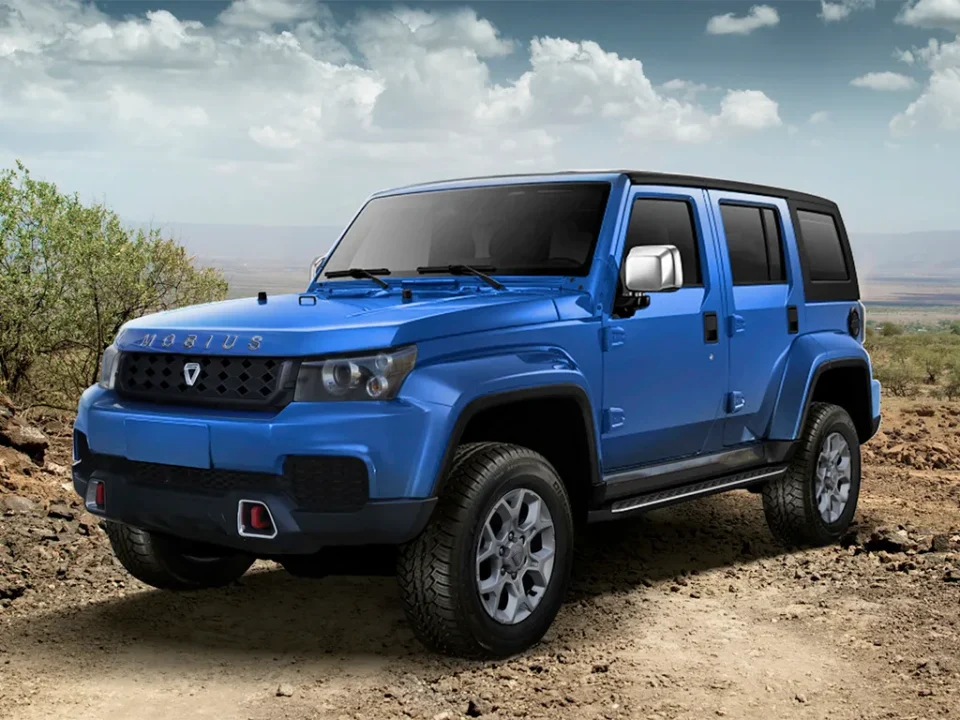The End of Mobius Motors: Kenya’s Pioneering Automaker Shuts Down
Mobius Motors, Kenya’s pioneering automaker, has entered voluntary liquidation after years of financial struggles. The company’s vision of producing affordable and rugged SUVs designed for African roads now faces an abrupt end.
On August 5, 2024, Mobius Motors’ shareholders resolved to place the company under liquidation according to Section 393(1)(b) of Kenya’s Insolvency Act 2015. The notice, issued by Director Nicolas Guibert, declared KVSK Sastry as the appointed liquidator. A crucial meeting of creditors is scheduled for August 15, 2024, at Mobius Factory (Sammer Africa, Mombasa/Enterprise Road Junction, Nairobi), where a resolution to approve the liquidator will be considered.
Additionally, the notice informs that a list of creditors and proxy forms will be available for inspection on August 9, 2024, at Mobius Motors’ head office in Sameer Business Park, Nairobi.
Reasons for Mobius Liquidation
The decision to liquidate follows nearly a year of attempts to save the company. Mobius Motors has been unable to settle debts with suppliers or pay employee salaries, resulting in unsustainable operational pressures. Despite raising $56 million across five funding rounds, Mobius Motors could not secure a significant foothold in Kenya’s competitive automotive market, which is predominantly dominated by second-hand imports from countries like the UK and Japan.
Background and Vision
Founded in 2009 by British entrepreneur Joel Jackson, Mobius Motors aimed to address the need for durable and affordable vehicles suited for Africa’s challenging road conditions. The company’s first model, Mobius I, was introduced in 2014, priced at $10,000 (KES1.3 million). Despite the innovative concept, Mobius struggled to capture a substantial market share
Mobius Motors’ Detailed Timeline of Events from Founding to Liquidation:
- 2009: Joel Jackson, inspired by his experiences in rural Kenya, founds Mobius Motors to create vehicles specifically designed for African terrain.
- 2010: Mobius Motors is incorporated in the United Kingdom and subsequently registered in Kenya in 2011.
- 2014: Launch of Mobius I, a stripped-down SUV priced at $10,000. The model targets SMEs in infrastructure, agribusiness, and supply sectors but faces mixed reactions due to its basic design.
- 2015: With backing from Playfair Capital, Mobius begins mass production. The company also releases Mobius II, aiming to improve upon the initial model’s shortcomings.
- 2018: Mobius receives significant funding from Chandaria Industries, DFC, and PanAfrican Investment. The company introduces Mobius II, which, despite improvements, still struggles to compete with second-hand imports.
- 2021: Mobius III is launched, featuring more advanced features but priced higher, at Ksh 3.9 million ($34,000). The company faces difficulty capturing a market dominated by cheaper, used imports.
- March 2021: Facing financial difficulties, Mobius seeks court protection from Kenya Revenue Authority’s tax demands of Sh73 million. The High Court grants a stay, provided Mobius offers a bank guarantee of Sh40 million.
- January 2021: Mobius opens a new KSh330 million manufacturing plant in Nairobi, with plans to produce eight units daily. The facility includes a comprehensive assembly line for passenger vehicles.
- March 2022: Mobius plans to ramp up production of Mobius II and considers expansion to regional markets like Uganda and Tanzania. The company faces increasing competition from rising second-hand car prices.
- June 2022: Mobius partners with Rubis Energy Kenya to offer nationwide service centers for Mobius 3 vehicles. The partnership ensures quality after-sales service and genuine parts for Mobius owners.
- August 2024: After a year of financial struggles, Mobius Motors enters voluntary liquidation. Director Nicolas Guibert issues an official notice, confirming KVSK Sastry as the liquidator. A meeting of creditors is scheduled for August 15, 2024.

The Mobius Journey, and Challenges:
Mobius Motors’ journey began with a bold vision to create affordable, durable vehicles for African roads. Joel Jackson’s initiative aimed to address the unique challenges faced by SMEs in remote areas requiring reliable transportation. The Mobius I, launched in 2014, was a testament to this vision, priced competitively at KES1.3 million ($10,000). However, despite its affordability, the stripped-down design received mixed reactions.
The subsequent models, Mobius II and Mobius III, introduced in 2018 and 2021 respectively, were aimed at improving upon the initial concept. The Mobius II, priced at Ksh1.5 million ($13,000), and Mobius III, at Ksh 3.9 million ($34,000), featured enhanced designs but struggled to compete with the flood of cheaper, second-hand imports dominating the market.
Financial Struggles and Court Protection
In March 2021, Mobius Motors sought court protection from the Kenya Revenue Authority (KRA) due to financial difficulties. The High Court halted KRA’s tax demands of KES 73 million, conditional upon Mobius providing a KES 40 million bank guarantee. The company’s financial reports revealed significant liabilities, highlighting its vulnerability and the potential for collapse if forced to pay the tax demand.
Efforts and Partnerships
In January 2021, Mobius inaugurated a new manufacturing plant in Nairobi, capable of producing eight units daily. This facility was part of a broader strategy to scale production and improve quality. Additionally, a partnership with Rubis Energy Kenya in June 2022 aimed to provide nationwide service centers for Mobius 3 owners, ensuring quality after-sales service and access to genuine parts.
Conclusion
The voluntary liquidation of Mobius Motors signifies the end of a bold and pioneering venture in Kenya’s automotive industry. The company’s journey, marked by innovation and ambition, ultimately succumbed to a confluence of challenging factors.
High Competition from Imported Cars: One of the most significant hurdles Mobius Motors faced was the overwhelming competition from imported second-hand vehicles. The Kenyan car market is flooded with affordable, reliable used cars from countries like Japan and the UK. This made it incredibly difficult for a homegrown automaker to carve out a significant market share, even with a product tailored to local conditions.
Lack of Proper Government Support: Despite its potential, Mobius Motors may not have received the level of support necessary from the government to thrive. If national and county governments had for example prioritized using Mobius vehicles for their fleets – instead of wasted on imports, it could have provided a stable customer base and a strong endorsement for the brand. Such support might have mitigated some of the financial challenges and provided the company with much-needed market validation.
Taxation Woes: Mobius Motors’ struggle with the Kenya Revenue Authority (KRA) over tax demands may have significantly strained the company’s financial health. The high tax burden and the protracted legal battle with KRA could have drained resources that could have been invested in product development, marketing, or expanding production capacity. This highlights the critical impact of taxation policies on the viability of local businesses.
Market Readiness for Huge SUVs: Another factor contributing to Mobius Motors’ difficulties was the market’s readiness—or lack thereof—for the type of SUVs the company was making. While the company’s vehicles were designed to withstand the rugged terrains of Africa, the demand for such robust vehicles may not have been as high as anticipated.






